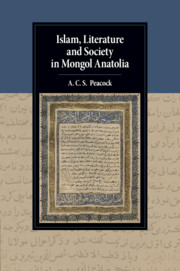Book contents
- Islam, Literature and Society in Mongol Anatolia
- Cambridge Studies in Islamic Civilization
- Islam, Literature and Society in Mongol Anatolia
- Copyright page
- Contents
- Illustrations
- Acknowledgements
- A Note on the Transliteration and Translation
- Abbreviations
- Introduction
- Part I Religion, Politics and Society
- Part II Literature and Religious Change
- 4 The Emergence of Literary Turkish
- 5 Vernacular Religious Literature
- 6 Apocalyptic Thought and the Political Elite
- Conclusion
- Bibliography
- Index
- Other Titles in the Series
- Plate Section (PDF Only)
6 - Apocalyptic Thought and the Political Elite
from Part II - Literature and Religious Change
Published online by Cambridge University Press: 07 October 2019
- Islam, Literature and Society in Mongol Anatolia
- Cambridge Studies in Islamic Civilization
- Islam, Literature and Society in Mongol Anatolia
- Copyright page
- Contents
- Illustrations
- Acknowledgements
- A Note on the Transliteration and Translation
- Abbreviations
- Introduction
- Part I Religion, Politics and Society
- Part II Literature and Religious Change
- 4 The Emergence of Literary Turkish
- 5 Vernacular Religious Literature
- 6 Apocalyptic Thought and the Political Elite
- Conclusion
- Bibliography
- Index
- Other Titles in the Series
- Plate Section (PDF Only)
Summary
This chapter examines the interest in the apocalypse and the Mahdi, the Muslim saviour expected at the end of time, found in works of the Mongol period. While the Mongols were themselves seen by many Muslims as one of the signs of the apocalypse, in fact apocalyptic and Mahdist discourse was adopted by the Mongols on their conversion to Islam to justify their rule. In addition, both Seljuq sultans and Mongol governors of Anatolia sought to assert legitimacy in the face of the political crises of the period by identifying themselves as Mahdis, while the requirement for the Mahdi to impose perfect sharia law led to increase in persecution of Christians, contributing to the process of Islamisation. Yet interest in apocalyptic is reflected only in texts of limited circulation destined for an elite audience; contrary to what is argued in much of the existing literature, there is no evidence that it was either widespread more popularly, especially among the Turkmen, or that is was associated with Shiism.
- Type
- Chapter
- Information
- Islam, Literature and Society in Mongol Anatolia , pp. 218 - 251Publisher: Cambridge University PressPrint publication year: 2019

